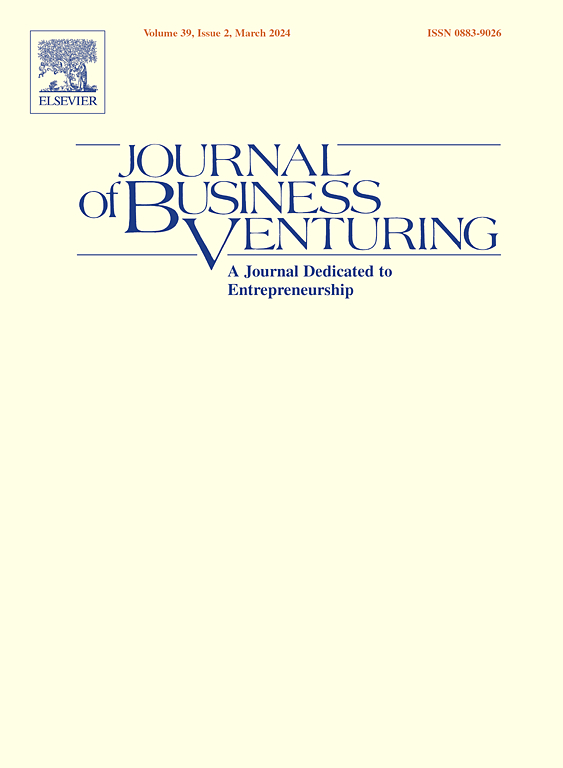Seeing human resources of entrepreneurial firms in new ways
IF 8.9
1区 管理学
Q1 BUSINESS
引用次数: 0
Abstract
Despite ongoing interest in human resource management (HRM) in entrepreneurial organizations, we believe the moment is ripe to rethink notions of human resource management in ways that take advantage of the distinctive nature of entrepreneurial settings. A critical first step is recognizing that the people creating and building an entrepreneurial organization extend beyond the founders and include people who may or may not be employees. As such, rather than following traditional human resources (HR) research's focus on employees, HR research in entrepreneurial organizations must take a broader perspective. We propose a focus on “joiners”, people who, according to Roach and Sauermann (2015), are a “distinct type of nonfounding entrepreneurial actors who are attracted to the startup work setting but have little desire to be founders themselves.” Joiners represent the human resources critical to venture progress. We argue that a research agenda focused on joiners that is pursued through explicitly understanding and engaging with the fundamental assumptions, debates, and conversations from an entrepreneurship perspective will yield novel questions and generate new insights. Through this editorial we hope to catalyze this important work by unpacking who joiners are and how they fit in the entrepreneurial context, highlighting the need for new research at the intersection of HRM and entrepreneurship, and suggesting novel questions, research opportunities, and methodologies related to HRM in entrepreneurial settings.
Executive summary
Scholars have advanced our Understanding of human resource management (HRM) in entrepreneurial organizations from multiple perspectives. We believe the moment is ripe to rethink notions of human resource management in ways that take advantage of the distinctive nature of entrepreneurial settings, which will allow us to understand human resources of entrepreneurial firms in new ways. A critical first step is recognizing that the people creating and building an entrepreneurial organization extend beyond the founders and include people who may or may not be employees. We propose a definition of joiners that captures the original spirit of the term and emphasizes the people who are actively choosing an entrepreneurial work setting, remains agnostic to formal employment status, and focuses on the work that is being done: “Joiners are non-founders who contribute physical and/or mental labor to a new venture and are subordinate to the founders”. Our definition is well-suited to the dynamic nature of entrepreneurial firms that are navigating uncertain environments, in which more flexible and less formal labor contributions are needed than merely those provided by employees. By consequence, our definition of joiners includes employees, contractors, interns, freelancers and volunteers and excludes other stakeholders such as tech transfer and other entrepreneurial support organization staff, board members, investors, policy makers, customers, and suppliers. We also suggest it may be helpful to distinguish between “primary joiners” and “secondary joiners.” The first refers to the initial group of people who are in direct contact with founders and who are creating their role rather than inhabiting an established role. These individuals bring the human and social capital that determines an early venture's success. Other individuals who later join an entrepreneurial venture, particularly those who are not directly overseen by founders, can be referred to as “secondary joiners”, or if they are actually employed by the startup, simply as employees.
We argue that the study of joiners merits fresh thinking that more explicitly takes into consideration the core aspects of entrepreneurship: that it involves uncertainty and dynamism, resource constraints and context dependence, informality, and social or interpersonal creation of opportunities, ventures, and systems. A traditional HR perspective is focused on employees within firms who are in a formal employment relationship, occupying defined roles, within a hierarchical reporting structure where there is a supervisor, a set of performance expectations, and a package of rewards. In contrast, an entrepreneurship perspective considers contributions from people who may be employees or contractors or non-contracted helpers, straddling the fuzzy boundaries of a new venture in roles and reporting relationships that are ambiguous and evolving, doing work that is uncertain and ever-changing, with risky and unknown outcomes, rewards, and career prospects. We highlight specific research questions focused on joiners from an HR versus an entrepreneurship perspective that warrant additional investigation and discuss the most appropriate methodologies for such study.
Overall, while we acknowledge and commend the efforts of many scholars who have already explored issues related to joiners, we believe that more explicitly recognizing and engaging with the distinct focus, assumptions, debates, and conversations inherent to an entrepreneurship perspective, as well as taking a broader perspective on who is a joiner, will inspire new questions and uncover novel insights into human resources of entrepreneurial firms. We encourage work that advances a uniquely entrepreneurship-informed understanding of joiners and of HRM.
以新视角看待创业型企业的人力资源
尽管人们对创业组织中的人力资源管理(HRM)一直很感兴趣,但我们认为,以利用创业环境独特性质的方式重新思考人力资源管理概念的时机已经成熟。关键的第一步是要认识到,创建和建设创业组织的人不仅仅是创始人,还包括可能是员工也可能不是员工的人。因此,创业型组织的人力资源研究必须采取更广阔的视角,而不是遵循传统的人力资源(HR)研究对员工的关注。我们建议关注“joiners”,根据Roach和Sauermann(2015)的说法,这些人是“一种独特类型的非创始创业行为者,他们被创业工作环境所吸引,但自己却没有成为创始人的愿望。”参与者代表了对企业发展至关重要的人力资源。我们认为,从企业家的角度出发,通过明确理解和参与基本假设、辩论和对话来关注参与者的研究议程,将产生新的问题和新的见解。通过这篇社论,我们希望通过揭示谁是参与者以及他们如何适应创业环境来促进这一重要工作,强调在人力资源管理和创业交叉领域进行新研究的必要性,并提出与创业环境中人力资源管理相关的新问题、研究机会和方法。学者们从多个角度加深了我们对创业组织人力资源管理(HRM)的理解。我们认为,重新思考人力资源管理概念的时机已经成熟,我们可以利用创业环境的独特性质,这将使我们能够以新的方式理解创业公司的人力资源。关键的第一步是要认识到,创建和建设创业组织的人不仅仅是创始人,还包括可能是员工也可能不是员工的人。我们提出了一个关于joiners的定义,这个定义抓住了这个术语的原始精神,强调了那些积极选择创业工作环境的人,他们对正式就业状态保持不可知论,并专注于正在完成的工作:“joiners是非创始人,他们为新企业贡献体力和/或脑力劳动,并从属于创始人。”我们的定义非常适合于处于不确定环境中的创业公司的动态特性,在这种环境中,需要比员工提供的劳动力更灵活、更不正式的劳动力贡献。因此,我们对参与者的定义包括员工、承包商、实习生、自由职业者和志愿者,不包括其他利益相关者,如技术转让和其他创业支持组织的员工、董事会成员、投资者、政策制定者、客户和供应商。我们还建议区分“初级接合者”和“次级接合者”可能会有所帮助。第一类人指的是最初与创始人直接接触的一群人,他们正在创造自己的角色,而不是居住在既定的角色中。这些人带来了决定早期创业成功的人力和社会资本。其他后来加入创业企业的个人,特别是那些不受创始人直接监督的人,可以被称为“次要参与者”,或者如果他们实际上被创业公司雇佣,只是作为员工。我们认为,对创业者的研究需要更明确地考虑企业家精神的核心方面的新思维:它涉及不确定性和动态性、资源约束和环境依赖、非正式性,以及机会、企业和系统的社会或人际创造。传统的人力资源观点关注的是公司内部有正式雇佣关系的员工,他们在一个分级报告结构中扮演着明确的角色,在这个结构中有一个主管,一套绩效预期和一揽子奖励。相比之下,企业家的视角考虑的是员工、合同工或非合同工的贡献,他们跨越了新企业角色的模糊界限,报告了模糊的、不断发展的关系,从事着不确定的、不断变化的工作,结果、回报和职业前景都存在风险和未知。我们强调了从人力资源与创业角度关注参与者的具体研究问题,这些问题需要进一步调查,并讨论了此类研究的最合适方法。 总的来说,虽然我们承认并赞扬了许多学者的努力,他们已经探索了与joiner相关的问题,但我们相信,更明确地认识和参与创业视角固有的独特焦点、假设、辩论和对话,以及对谁是joiner采取更广泛的视角,将激发新的问题,并发现创业公司人力资源的新见解。我们鼓励开展工作,促进对参与者和人力资源管理的独特创业知识的理解。
本文章由计算机程序翻译,如有差异,请以英文原文为准。
求助全文
约1分钟内获得全文
求助全文
来源期刊

Journal of Business Venturing
BUSINESS-
CiteScore
16.70
自引率
6.90%
发文量
59
审稿时长
77 days
期刊介绍:
The Journal of Business Venturing: Entrepreneurship, Entrepreneurial Finance, Innovation and Regional Development serves as a scholarly platform for the exchange of valuable insights, theories, narratives, and interpretations related to entrepreneurship and its implications.
With a focus on enriching the understanding of entrepreneurship in its various manifestations, the journal seeks to publish papers that (1) draw from the experiences of entrepreneurs, innovators, and their ecosystem; and (2) tackle issues relevant to scholars, educators, facilitators, and practitioners involved in entrepreneurship.
Embracing diversity in approach, methodology, and disciplinary perspective, the journal encourages contributions that contribute to the advancement of knowledge in entrepreneurship and its associated domains.
 求助内容:
求助内容: 应助结果提醒方式:
应助结果提醒方式:


